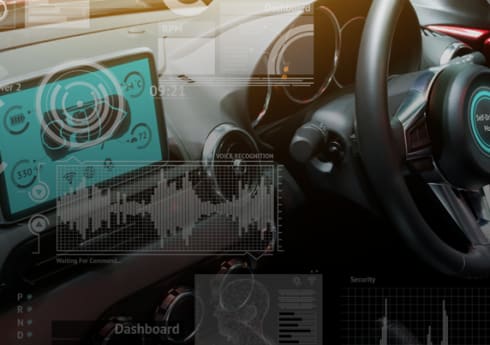Company Vehicle Tracking and the Law in Ireland
If you’re using GPS vehicle trackers across your fleet, or you want to, you may be wondering about whether it’s legal.
Company vehicle tracking and the law doesn’t have to be daunting for any business. There are some steps you need to take, but it’s easy to master. And we cover all of those in this guide to company vehicle tracking and the law.

What’s vehicle tracking?
With a vehicle tracker telematics device fitted to the vehicles in your fleet, or company cars, you can keep track of everything your employees do.
It feeds lots of data back to your online account, such as real-time location tracking, vehicle updates and bad driving alerts.
Really, it’s essential for any modern business to have these devices.
But while it’s great for business management, it does create a shady area for privacy. And you may wonder whether it’s all legal and above board.
It’s a bit of a grey area, so read on below to find out your business’s standing.
Company vehicle tracking and the law in Ireland
If your business uses telematics such as vehicle trackers, there are laws you really need to know about. The vehicle tracking laws are:
- General Data Protection Regulation (GDPR).
- The Irish Human Rights and Equality Commission Act 2014.
There’s also the Data Protection Act you may have heard of, but GDPR replaced this in 2018.
And why the need for these regulations? Simply because using vehicle trackers, and other telematics, involves you gathering a lot of personal data.
And with international GDPR laws in mind, you need to follow the rules. If you don’t, there are two types of fines you may face:
- An immediate fine of €20 million.
- A fine of up to 4% of your annual revenue.
Company vehicle tracking and the law isn’t complicated. As you can see, it’s just vital you make it clear when you’re using personal data for business needs.
And that’s the same for whether it’s your employees, customers or clients.
What do you need to tell your drivers about vehicle trackers?
This is the big question from Irish businesses! And the answer for company vehicle tracking laws is you’ll need to let your drivers know you’re using telematics devices.
It’s perfectly legal to use the technology for business purposes. What would be illegal? If you stuck trackers on your employees’ personal cars and started monitoring what they do during their time off. That’s breaking the law.
And with your business trackers, you must let your employees know you’re tracking them and using data from their daily trips to manage your business.
You can track vehicles such as:
- Cars.
- HGVs.
- Trucks.
- Vans.
Most of your drivers should be fine with that! Just explain the benefits and how it’s good business practice to do so.
You should make this clear to your employees (including new starters). One way to do that is have a section in your contract of employment explaining vehicle trackers and the data you gather. Basically, you need a good business reason to track drivers.
And in this case, you have one if you’re a fleet and it’s the main part of your daily operations.
Write up a policy on all of this, too, so you have this down in writing. And you need to make sure all your employees acknowledge the tracking devices. Signing their contract of employment is the right step there.
It may seem obvious! But some businesses don’t go through with that.
iCompario tip: You’re tracking the vehicle, not the person
The most important thing to remember with vehicle tracking and personal data laws is what you’re doing. By having GPS trackers, it’s not about tracking your employees.
GPS tracking employees laws is really about tracking your vehicles, ensuring your cargo is safe and looking after your business interests. This is why it’s legal to use them, as you can justify why you’re tracking data.
What is GDPR 2018?
GDPR affects all businesses across Europe, no matter how big or small the organisation is. In Ireland, the Data Protection Commission (DPC) is a national, independent authority that upholds the laws.
Simply put, GDPR lets your business know how to:
- Collect data.
- Handle data.
- Store data.
What you need to deliver on to stay compliant with the law is meet GDPR expectations. These are:
- Fairness and transparency.
- Informing the driver.
- Updates on any changes in your policy and consent from the employee if you start collecting more data.
- Only holding data for legal time periods, then removing it within the legal limit.
- Protecting the data you store against unlawful access, unauthorised access or damage.
That may seem a little bit more complicated, but it’s really just about being transparent with your employees and customers.
If you’ve got nothing to hide, then you’ll most likely remain complaint with GDPR laws. Just make sure you’re aware of any changes, as these do happen from time to time.
How you can benefit from business telematics
Okay, with the above in mind, how can this technology benefit your business? Well, with commercial vehicle telematics you can use it to save time and money.
Plus, they can help you sharpen up your business and become ultra-professional. With vehicle tracking data, you can expect these benefits:
- Cost-savings: From saving fuel to monitoring vehicles for repair issues, you can use the data to optimise your fleet and work smarter as a business. And that can help you save budget in the long-term.
- Promote safe driving practices: If a driver in your fleet isn’t sticking to your driving code, then you’ll get alerts about that. And you’ll be able to stamp out any poor driving that reflects badly on your business.
- Protect your vehicles: With a tracker, you’ll know where your fleet is at all times. If anything is stolen, you’ll also know its whereabouts. A quick alert to the police and you can get your vehicle back fast.
- Real-time alerts: Whether a vehicle has maintenance issues or a driver has an accident, you’ll get an alert instantly. It puts you in a position to address the issue fast and limit the damage.
- Improved vehicle maintenance: You really can keep track of your fleet’s vehicles. Spot a problem with a car, van or HGV? You can get it in for repairs fast, limiting downtime and saving you money.
Fact is, so long as you stay within the law on your data gathering, then telematics is a chance to future-proof your business.
You can get a cutting-edge fleet packed out with gadgets that protect your business’ interests, as well as your employees’.
Just make sure to tell them you’re tracking them! Then you’re golden.
Want to get setup with vehicle trackers?
If you’re happy with your company vehicle tracking and the law knowledge and want to go ahead and get vehicle trackers, then one of the best ways is to compare the market.
By doing so, you can find the best deals from the best providers. And ones that meet your exact business needs. All you have to do is:
- Enter your business details.
- Wait for your results.
- Pick from your recommendations.
It’s as simple as that! It’s free to do and it’ll save you time and money. So, don’t delay! Vehicle trackers are only a button click away.


